
Margaret,
As part of “What matters to you” day (WMTY) activities we had conversations with our patients and staff in the Haematology ward at University Hospital Monklands.
The Haematology ward admits patients from across Lanarkshire with blood disorders. Unfortunately, the diagnosis and treatment can often mean a lengthy inpatient stay, so it was really important not only to focus on ‘WMTY’ but to also engage with the nursing team to adopt the WMTY process in an effort to bring this into daily practice.
Haematology patients can often feel very lonely during their stay as their clinical condition can demand lengthy periods of isolation. We are aware of this and were prepared to hear how this can affect them. Their diagnosis and prognosis can be extremely difficult and challenging. Often ‘anger and frustration’ can affect their progress.
We decided on the format of our approach and agreed we would -
- Advise all staff (medical and nursing) of the WMTY day.
- Obtain resources, watch any videos and learn as much as possible before 6th June to ensure our efforts were optimised
- Be brave – we were possibly about to hear negative comments about the ward
- Think about ‘breaking the rules’ – it might be something that we would need to work hard to resolve for the patients’ benefit
- Understand that clinical barriers and boundaries might be a challenge
On the day we:
- Invited ‘well’ patients to have a chat with us together in a quiet area of the ward
- Share why it’s important to hear if something was troubling the patient and give them an opportunity to give us the chance to change things to help in their care pathway.
- Invited staff to share their own personal experiences and what mattered to them. By doing this we hoped to share how to have the discussion with patients and relatives
- Reflect on what the patients and staff said – taking actions as soon as possible to make changes appropriately
What we heard:
- All patients and staff told us the ‘heat’ of the ward was unbearable
- Patients were yearning to get home
- Most patients told us they hated the food
- All patients complained about the boredom factor
- Not seeing the children was ‘torture’
- All of the patients thanked us for the opportunity to talk
What we did:
- Contacted the Estates department who attended the ward to reduce the temperature. This made it more comfortable for the patients, relative and staff (our windows do not open in the ward as we have ‘clean hepa filtration’ running and the open windows affect the efficiency of the system)
- Agreed to start early discharge planning for two of the patients. Discussions then took place with the medical nursing and pharmacy teams to ensure that plans were progressed to facilitate the discharges on the agreed dates. Further discussions then took place with one of the patients regarding her prognosis and next steps. This was not a good prognosis and it was very upsetting for the patient. Early discharge was the right thing to do as she needed quality time with her family.
- Patients can often have difficulty with the food when effect of chemotherapy treatment can change the patient’s approach to food as taste buds can change. We discussed the possibility of having taster nights in the ward for patients, an example would be ‘Friday night is Pizza night’. We are now in the process of securing a local pizza provider to ‘donate’ some tasty pizza’s on a monthly basis. We also have ideas of having each Friday night as the ‘patient night’ to try different food ideas.
- Boredom can be an impossible challenge; however, we have had further discussions with patients and we have also received donations of board games. We might introduce some competitions such as a "chess" or "draughts" challenge in the future. All these ideas will be shared on the patient noticeboard – which will become a focus for the patients and staff to post messages, tell us stories and even share the odd joke or two! We have some endowment funds so we are hoping that we can use this person-centred approach to look at other ways to enrich people's stay and eliminate boredom.
- We have guidelines and rules in the ward which currently excludes children and grandchildren from visiting but we are reviewing this as we understand that this can be difficult for patients and their families to cope with which can directly affect their progress.
- We will now continue in the WMTY theme to ensure all patients have an opportunity to share their ‘worries’ without always thinking the clinical ‘stuff’ is more important than how people are feeling.
If you have an experience of NHS Lanarkshire Services you would like to share, please speak to a member of staff, respond on Care Opinion, or visit the “Your Feedback” Section of the NHS Lanarkshire website to see the other ways to get in touch www.nhslanarkshire.scot
We are listening to our patients and staff
We are listening to our patients and staff https://careopinionuk-staging.azurewebsites.net/resources/blog-resources/23-images/9d792cf46f2b43b790fb573d49ecc89c.png Care Opinion 0114 281 6256 https://www.careopinion.org.uk /content/uk/logos/co-header-logo-2020-default.pngUpdate from NHS Lanarkshire
Posted by Margaret Kelly, Service Manager, Haematology and Cancer Services, University Hospital Monklands, NHS Lanarkshire, on
About: NHS Lanarkshire
Thanks for your feedback.
